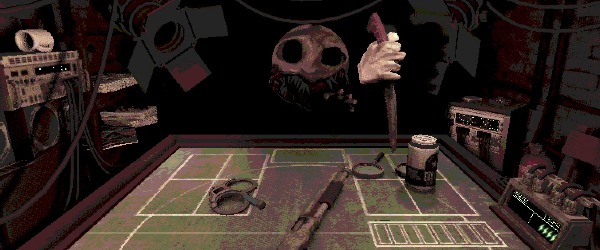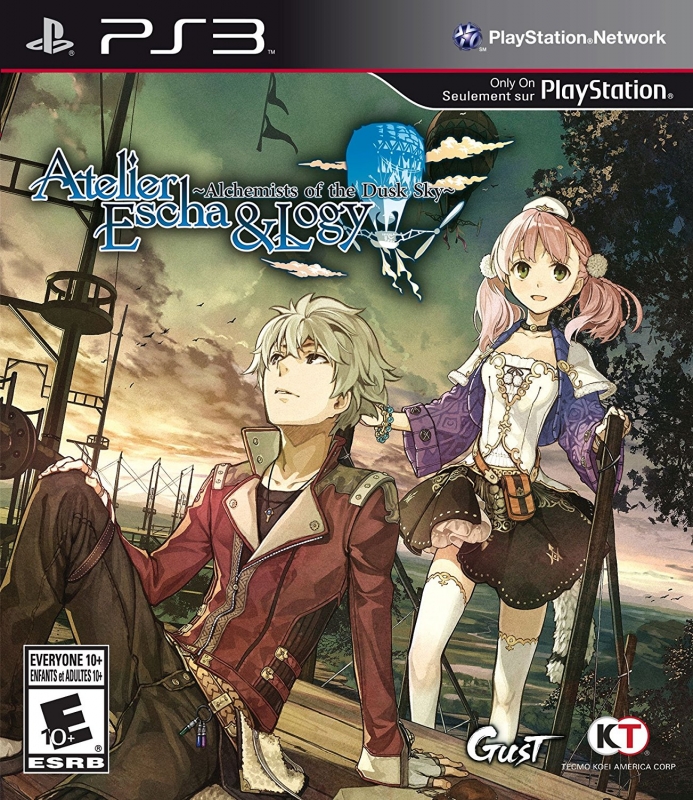
Atelier Escha & Logy: Alchemists of the Dusk Sky (PS3) - Review
by Karl Koebke , posted on 14 March 2014 / 5,326 ViewsIn an age when JRPG releases - particularly those on consoles - are fewer and farther between, it's hard not to love Gust's Atelier series for the PlayStation 3. Normally the idea of an annualised JRPG series would be a ridiculous notion, but by keeping the budget small and cutting some corners in presentation Gust have done the impossible while continually improving the formula with nearly every iteration. Does the company's latest experiment with dual protagonists keep this trend alive?
The idea behind Atelier Escha & Logy was that the choice between two protagonists would give players the option to choose between the more standard Atelier gameplay of crafting and gathering (Escha's campaign), or the more traditional JRPG gameplay which focused on exploration (Logy's campaign). In practice the differences are much less meaningful than that, though they are still very much appreciated. The two campaigns differ almost exclusively in story content instead of through gameplay. While this revelation is disappointing, seeing the events unfold from a different character's perspective does nonetheless increase the game's replay value beyond attempting to get the perfect ending on your second playthrough in New Game+.
One of the most appealing aspects of the Atelier Arland titles was that the narrative was very focussed. Instead of tromping around the world trying to save it, you would work to maintain your mentor's 'atelier', or find a long lost mother. It wasn't until the commencement of the Alchemist of Dusk series that I realized that a tighter main storyline does not have to preclude the inclusion of a larger over-arching narrative. Both Atelier Ayesha and Atelier Escha & Logy exemplify this idea by staying mostly focused on the day-to-day goals of the characters while every now and then delving into more serious matters, touching on the status of the larger world and an ancient civilization that self destructed, leaving almost no trace of its existence. All of this helps to bring the narratives of the series together and keeps things interesting when the characters' personal goals hit a low point. I've still yet to be as enthralled by the narrative as I was with Atelier Totori, but including these larger overarching themes definitely helps to bridge the gap.
If you're completely new to the series please feel free to read one of my older reviews (links) in order to get a handle on the basic gameplay. Simply put, Atelier titles are all about gathering materials, creating things using those materials, beating up monsters along the way, and managing your time while doing it. As the series has matured the time management component has become markedly easier to work around, with alchemy no longer costing mana to use and therefore no use for your atelier's couch to regain your strength. Getting tired from traveling also used to be a consideration in older games that is no longer relevant.
For the most part I think these changes are for the better, but if the time management continues to get simpler then the amount of general content is going to have to be increased. Atelier Escha & Logy's task system is based on quarters of the year, with a total of 25 possible tasks to complete each quarter and only one of these being necessary for progression. With all the improvements that have been made to the general efficiency of gameplay, however, I found myself completing all of these tasks within the first month and a half and often running out of meaningful activities to spend the rest of my time on. Future releases should definitely consider either upping the number of optional activities and areas to explore, so that veterans don't get bored, or including a higher difficulty level as a choice that perhaps brings back some of the challenge from previous iterations. Again I'm going to call back to Atelier Totori, which I feel had a perfectly balanced time management system where the tasks were totally up to the player but you had to gain a certain score before the due date by completing any combination of tasks you saw fit. Something like this, albeit with the more modern gameplay systems, would be much appreciated over the linearity of recent Ateliers.
Time management may have taken a slight hit, but the other facets of Atelier Escha & Logy have most definitely improved. Battles are now fought with six total party members: three in the front and three in reserve. The three in reserve can then be switched in and out throughout the fight and participate actively in support attacks and defense. It's a definite improvement over previous titles. I particularly like how having two alchemists allows two different people in your party to use items and that they each come with their own special support attack which powers up the items the second alchemist uses. Managing your support meter has become even more important than in previous Ateliers and this helps to bring increased strategy to battles, particularly those with bosses.
The bombs and healing items you craft in your workshop have always been a core part of the strategic gameplay in Atelier titles but previously their relative rarity relegated them to mostly being for boss fights. When you knew you were off to fight a boss you would just pack your basket with every explosive you could muster, but otherwise items were used sparingly in regular combat so that you wouldn't waste the materials. Atelier Escha & Logy circumvents this problem rather brilliantly by allowing players to register a certain amount of adventure equipment which is automatically replenished when you return to the base, so now there's no reason not to use those bombs when out on a regular gathering trip.
This has two very big implications. The first, which I've already mentioned, is that items no longer have to be viewed as precious commodities and can therefore be used to speed up non-boss fights immensely. Another change that may not be immediately apparent is that now you have to think a little harder about what items you bring in to said boss fights because you cannot simply load up your basket with everything you have that goes boom; the adventure equipment is all the firepower you're able to bring to bear. This adds another layer of strategy to the game, as you'll want to use alchemy to try and make the best items possible that take up the least space in your adventure equipment slots, in order to give yourself a leg up on a particularly difficult boss. Overall I think the changes to the gameplay are great at preventing players from getting bogged down in the more mundane tasks, but the series now needs to find a way to fill in the dead time that comes from this new efficiency.
Atelier Escha & Logy is a slight improvement over previous games in both presentation and value. The music is fantastic as always, and dual language options are available for anyone that takes issues with the English cast. I would still like to see more English voice acting, with fewer events being read in silence, but it's hard to argue with the economics involved in that decision. Visually there's a notable upswing in quality, but the telltale signs of a budget release are still rampant, with animations often being avoided in order to cut costs. Again, this is a decision that I think is regrettable but that I have a hard time arguing against given the practicalities involved. My playthrough of Atelier Escha & Logy took me roughly 37 hours, although I skipped a few months near the end when I had literally nothing left to do that I felt was worthwhile. There's a bit more replay value on offer than in previous games due to the dual protagonists, but don't go in expecting the two campaigns to be wildly different in content.
Over the years the Atelier series has brought a lot of consistently good to great JRPG gaming to my PS3 and I can't help but thank Gust for that. With this latest entry I think there are a lot of improvements being made to the series, especially in the realm of narrative and gameplay tweaks, and this has made the series as a whole more enjoyable and strategic in nature. This, however, exposes an overall lack of content - all too often I found myself wandering aimlessly waiting for the next assignment period to come up.
I'm hopeful that combining these new gameplay systems with an assignment system that is similar to the one found in Atelier Totori (and perhaps a main storyline more similar to that in emotional impact as well) could make for the perfect Atelier title; one that I would recommend to every JRPG fan that would be willing to listen. As it is, though, Atelier Escha & Logy is a very good title that certainly deserves your attention, I just won't be shouting its praises from the rooftops just yet.
VGChartz Verdict
7.8
Good
This review is based on a digital copy of Atelier Escha & Logy for the PS3, provided by the publisher.


























